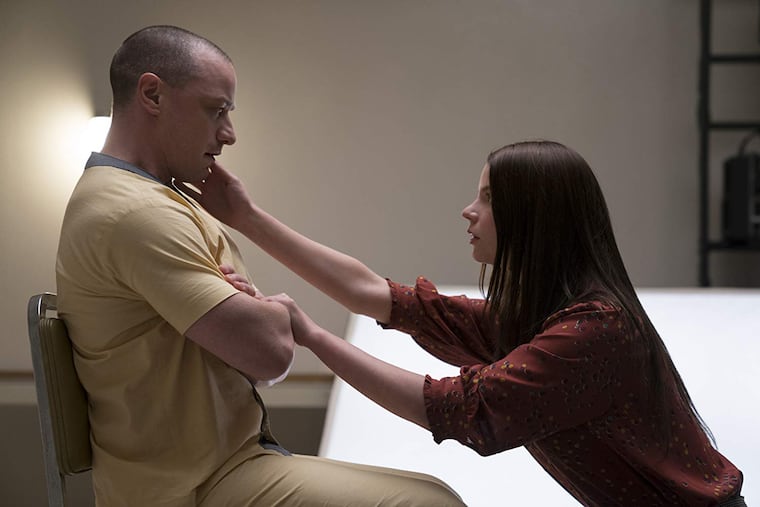‘Glass’: M. Night Shyamalan’s newest film is half full | Movie review
M. Night Shyamalan concludes a trilogy with ‘Glass,’ combining characters from ‘Unbreakable’ and ‘Split.’

For all of the talk in the Glass prequels — Unbreakable and Split — of mass murder and torture and kidnapping and other unpleasantness, bone-deep terror (all are PG-13) was not their primary calling card.
Split, for instance, was about a guy named Kevin Wendell Crumb, played by James McAvoy who turns dissociative identity disorder into a mixtape. Crumb is a sometime serial killer called The Beast, one of his two dozen personalities — a multitude suggested by a sink-side cup full of toothbrushes.
So there were 24 people in there, each practicing good dental hygiene, making The Beast the first maniac to be endorsed by the American Dental Association.
On top of that there is always the abiding (sixth?) sense that the garish flourishes were a gambit, meant to disguise a hidden agenda. Fans know that writer-director M. Night Shyamalan is forever up to something — like his Unbreakable antihero Elijah Glass (Samuel L. Jackson), he likes to use sleight of hand, to show us one thing, while he’s secretly doing another.
“Have you ever seen a really good magician?”
The question in Glass comes from psychiatrist Ellie Staple (Sarah Paulson), who likes to collect and study people suffering under the “delusion” that they have superpowers. She’s got Elijah Glass locked up in an insane asylum and as the movie opens, she’s adding to her collection, including Unbreakable’s David Dunn (Bruce Willis) and the occasionally beastly Kevin.
The latter two have been making front-page news in Philadelphia — Dunn for prowling the streets as a vigilante known as The Overseer (a word apparently chosen in spite of its historical connotations), Kevin is still kidnapping uniformed cheerleaders, and both are apprehended after a squaring off at the movie’s outset.
In custody, they are poked, prodded, and examined by Dr. Staple, who holds group therapy sessions in a pink room, where she seeks to convince the men they aren’t really superstrong or supersmart, just people hyper-compensating for personal trauma.
Is she right? Well of course not, and what kind of fun would that be? Shyamalan even winks at us, mentioning by name The Exorcist, in which we see that medicine and psychology are a poor match for the biblical evil that has possessed Linda Blair.
Dr. Staple represents the kind of professional-class doubter, cynic, skeptic, and nonbeliever who pops up in his films — the sort who doubts the exceptional (and is on some level envious of it).
She’s out to debunk her patients’ perception that their special abilities are superpowers, and rejects Elijah’s belief that comic books are just the latest form of mythmaking and storytelling that humans use to explain the gifted among them — people like The Beast and The Overseer.
Since Shyamalan first unveiled this idea in Unbreakable, other superhero movies have played around with a mix of the actual with the mythical. Christopher Nolan pushed real-world themes (the war on terror, income inequality, and Hurricane Katrina) into his Dark Knight movies. Logan suggested that X-Men get old, and sick, and frail, while taking aim at anti-immigrant sentiment. Deadpool turned comic book meta-commentary into comedy.
Shyamalan got there first, and has a different agenda — his “superheroes” are essentially human, functioning at the outer limits of the species’ physical capacity. Their behavior arises from human pain.
The first of these Shyamalan figures, you could say, was Cole Seer, way back in Sixth Sense. He needed his mother to believe in his extraordinary gifts, and their concluding scene was genuinely emotional. These elements blend less smoothly in Glass — Elijah and Kevin Crumb don’t merely suffer, they cause suffering. They are often self-pitying and self-aggrandizing, and their rhetoric — “Kneel before me!” — is indeed delusional.
And relationships matter less — Anya Taylor Joy returns up as Kevin’s liberated captive, a grown-up Spencer Treat Clark returns as Dunn’s son — but nearly everything in the movie’s big reveal section is plot-driven.
There is a lot of plot in those final minutes, and don’t bother trying to outguess the magician. He pulls a rabbit out of a hat, just to distract you from the next rabbit.
MOVIES
Glass
Directed by M. Night Shyamalan. With Bruce Willis, Samuel L. Jackson, James McAvoy, Sarah Paulson, Anya-Taylor Joe, and Spencer Treat Clark.
Running time: 2 hours, 9 mins.
Parents guide: PG-13 (violence including some bloody images, thematic elements, and language)
Playing at: Area theaters.